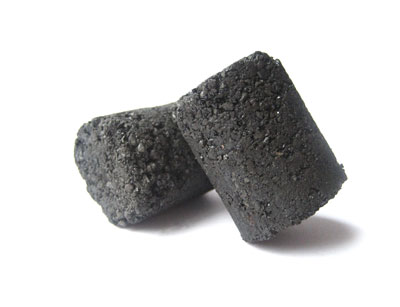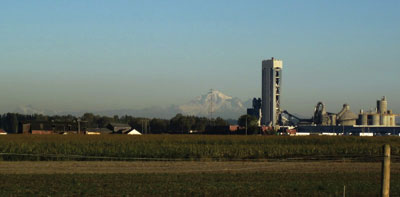
Filling the Gap
November 29, 2012
By
John Tenpenny
Since its inception four years ago with a mandate to drive the growth of B.C.’s low-carbon economy, Pacific Carbon Trust has retired 1.5 million tonnes of carbon offsets.
Since its inception four years ago with a mandate to drive the growth of B.C.’s low-carbon economy, Pacific Carbon Trust has retired 1.5 million tonnes of carbon offsets. Now it is expanding its mandate and beginning to stimulate new activities, including the production of bio-coal.
 |
|
| Bio-coal, made from roasted biomass, has comparable energy density to coal but with a significantly smaller carbon footprint.
|
The provincial Crown corporation recently launched a request for proposals specifically to purchase carbon offsets resulting from switching from fossil-fuel coal to renewable bio-coal. It says both bio-coal producers and coal users point to a difficult gap in the pricing between coal and bio-coal, which is why Pacific Carbon Trust is responding to the emerging bio-coal industry’s needs by reserving a portion of its offset portfolio for greenhouse gas emissions realized by switching from coal to B.C. bio-coal.
“We are offering to purchase greenhouse gas emissions reductions from fuel-switching projects in B.C. where coal and other greenhouse gas intensive fuels are replaced by B.C. bio-coal,” says Scott MacDonald, CEO of Pacific Carbon Trust. “The revenue stream realized by the sale of emissions reductions can support B.C. bio-coal producers in transitioning to full commercial operations.”
By switching from coal – an emissions-intense, non-renewable energy source – to sustainable bio-coal, coal users can reduce the greenhouse gas emissions at their facilities, thereby creating the opportunity to realize offsets for the tonnage of emissions avoided.
According to MacDonald, this allows traditional coal users to both save on the carbon tax applied to coal and generate revenue from offsets through fuel-switching, making the price of bio-coal per tonne on par with that of coal.
“The bio-coal industry, which is the next generation “wood pellet” industry, holds significant export potential and improved competitiveness for B.C.’s existing and growing export biomass industry,” says Michael Wheedon, executive director of the BC Bioenergy Network.
Bio-coal suppliers are getting financing and lining up supply, but what’s missing, says MacDonald, is a firm price that makes the venture economically viable and Pacific Carbon Trust is trying to fill that gap.
Having a carbon tax is the first step in changing those fundamental economics, he says.
“If you’re burning coal in B.C., you’re paying a carbon tax. If you switch to bio-coal you no longer pay the carbon tax and in essence there is a $30/tonne emissions savings. We can compound that by buying offsets. The combination of the two are often enough to kick the economics over the threshold.”
Through its commitment to buy a certain volume of offsets per year, MacDonald says, those burning coal now have the price certainty needed to make the switch to bio-coal. It would also give the suppliers the certainty to open up the supply chain and begin building a supply.
“British Columbia has tremendous potential to become a global leader in bioenergy by supporting the growth of the bio-coal industry,” says Jerry Ericsson, president of Diacarbon Energy Inc., a Burnaby-based producer of renewable fuels. “This RFP sends an important signal to investors that there will be a reliable market for bio-coal, which helps companies like Diacarbon move forward towards commercialization.”
Replacing coal
Traditional coal is used extensively in industry in B.C., particularly by cement manufacturers, such as Lafarge, which has previously sold offsets to Pacific Carbon Trust for a fuel-switching project at its Richmond cement plant.
That project saw Lafarge reduce the amount of coal burned by replacing a portion of this coal with biomass and other materials from construction waste, which otherwise would have gone to a landfill.
The company says it is always looking for other ways to reduce emissions.
“Lafarge has many varied sustainability initiatives worldwide geared to reducing our environmental footprint,” says Randy Gue, director of resource recovery and business development at Systech Development, a division of Lafarge. “We view bio-coal as another potential opportunity to further reduce this footprint by increasing the renewable energy component of our fuel requirements. We look forward to seeing this industry develop into a viable and robust business.”
Bio-coal potential
Bio-coal is created through the torrefaction (French for “roasting”) of biomass that results in a dry, enhanced product with an energy density on par with the energy density of coal. It is a high-grade solid fuel suitable for multi-purpose commercial and industrial use that is easy to transport and store. It has similar characteristics to ordinary coal with the vital difference that it is a clean, renewable resource.
 |
|
| Lafarge’s Richmond cement plant has already reduced the amount of coal burned by replacing a portion with biomass and is looking at the possibility of using bio-coal.
|
During torrefaction of biomass, the biomass typically loses 20% of its mass but only 10% of its energy content. After being torrefied, biomass can be densified – typically into pellets or briquettes – to further improve its energy properties.
MacDonald says the abundance of biomass available in B.C. in the form of slash piles, mountain pine beetle kill wood and other byproducts of the pulp and paper industry, is one reason B.C.’s emerging bio-coal industry has tremendous potential to meet local demand and become a major international supplier. He cited a report conducted earlier this year by Bloomberg New Energy Finance estimated that there is a need for 700 bio-coal plants worldwide, each with an annual output of 100,000 tonnes over the next 10 years. The report noted Canada is well positioned as a potential supplier.
Pacific Carbon Trust has invested in many greenhouse gas projects as part of its aggressive plan to address climate change, with bio-coal being the just the latest.
“As a supporter of the province’s clean-tech sector through innovative emissions reductions projects and technologies, Pacific Carbon Trust has a role to play in the growth of this nascent industry,” adds MacDonald. “Just as we have supported low carbon practices in other B.C. sectors, Pacific Carbon Trust is supporting the creation of a marketplace for this alternative fuel.”
Print this page